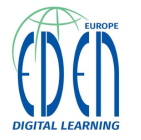This entry has been written shortly after returning from our two day Executive Committee meeting in Porto, hosted by the Universidade Aberta of Portugal and its Vice President Professor Antonio Teixeira, himself a member of the EDEN EC.

Our task at this meeting, as well as dealing with regular business, was to reflect on where EDEN has come from over the last year and where it is going: a sort of retreat. We started by examining what the constitution set as the core purposes of EDEN, namely our ‘commitment to fostering developments in open, distance, flexible and e-learning, providing a platform for all regions and countries of Europe for collaboration and co-operation for all sorts of organisations’. We looked carefully at the growth of EDEN, which continues both for institutional and individual members. We admitted 6 new institutions to EDEN at this meeting, and now have over 200 institutions in membership as well as some 1200 individuals. EDEN does cover a range of organisations as it always intended to do: while the great majority are Higher Education institutions who have a blended offer, we also have companies and organisations in the fields of on-line learning, media and publishing, as well as schools, colleges and other networks. We noted with pleasure the increasing interest in EDEN from institutions and organisations outside Europe, especially the USA and China. Our journal EURODL continues to be supported by the European community as well as wider afield, publishing some 30 refereed articles over the last 12 months.
Our core conclusion was that we want to further develop the service to and engagement of members to EDEN, and we will examine in particular ways in which awards for excellence might provide a framework for building that. I am tasked with providing a draft proposal for an Award for Excellence in Innovation in Distance and E-Learning that we will circulate to EDEN Senior Fellows and others for consultation before bringing forward.
Our regular business included the final preparation for the main 2009 EDEN conference in Gdansk, Poland. We have more than 200 papers submitted, a range of exciting keynote speakers, and an exciting city and seaside to explore (see the conference section of the EDEN website!). We also discussed, led by Antonio Teixeira, the arrangements for the Open Classroom conference in Porto later in October this year. The conference centre is the former Customs House, right on the banks of the River Douro, and is a splendid setting. The city of Porto, I should report for those who do not know it, has a magnificent landscape, built above the high banks of the Douro, and with 6 wonderful bridges cross-crossing at high level. The river banks are also home to the range of producers of port wine, many which had British origins, with the vineyards lying up the river and the cellars lying in the city. Some of the traditional boats that transported the port in barrels are still in use, and can be seen going up and down.

Back home at the Open University UK, the first evidence of the economic recession is beginning to appear in reports from directors of training and development in large companies reporting that they have less to spend than they had a year ago. At the same time they report that this will impact in particular on sending people away for training and education, and for our field of work with its flexible approaches this could and should mean opportunity.




